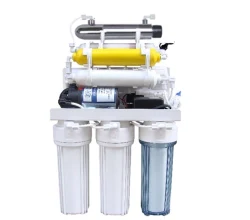Features and considerations related to UV-C light filters
2023-12-04
UV-C (Ultraviolet-C) light filters, also known as UV-C air purifiers or UV-C germicidal lamps, are devices that use ultraviolet light to disinfect air and surfaces by inactivating or destroying microorganisms such as bacteria, viruses, and mold. Here are key features and considerations related to UV-C light filters:
Characteristics of UV-C Light Filters:
1. Wavelength:
- UV-C light operates in the ultraviolet spectrum with wavelengths between 200 and 280 nanometers. The most germicidal UV-C light is typically around 254 nanometers.
2. Germicidal Effect:
- UV-C light is effective in disrupting the DNA and RNA of microorganisms, preventing them from reproducing and rendering them inactive. This makes it a powerful tool for disinfection.
3. Airborne Microorganism Disinfection:
- UV-C light filters are designed to disinfect air by exposing it to UV-C light as it passes through the purifier. This can help reduce the concentration of airborne bacteria and viruses.
4. Surface Disinfection:
- UV-C light can be used for surface disinfection in specific applications, such as UV-C lamps installed in HVAC systems or portable UV-C devices for targeted disinfection.
5. Integration with Air Purifiers:
- UV-C light filters are often integrated into air purifiers, either as standalone units or in combination with other filtration technologies such as HEPA filters or activated carbon filters.
6. Timer and Sensors:
- Some UV-C air purifiers come with timers or sensors to control the duration of UV-C exposure, ensuring effective disinfection without unnecessary energy consumption.
7. Application in HVAC Systems:
- UV-C lamps are sometimes installed in heating, ventilation, and air conditioning (HVAC) systems to disinfect the surfaces of coils and other components, preventing the growth of mold and microbial contamination.
Considerations:
1. Safety Precautions:
- Direct exposure to UV-C light can be harmful to skin and eyes. Many UV-C air purifiers have safety features such as automatic shutoff when the purifier is opened. It's important to follow safety guidelines provided by the manufacturer.
2. Effectiveness Against Particles:
- UV-C light filters are primarily effective against microorganisms, not particles like dust or pollen. When used in combination with other filters, they provide comprehensive air purification.
3. Limited Range:
- UV-C light is effective within a specific range and requires direct exposure to the light source. Shadows or areas not directly exposed to UV-C light may not be effectively disinfected.
4. Maintenance:
- UV-C lamps may degrade over time, reducing their effectiveness. Regular replacement according to the manufacturer's recommendations is essential for continued performance.
5. Application in Specific Settings:
- UV-C light filters are often used in healthcare settings, laboratories, and areas where a high level of disinfection is required.
6. Effect on HVAC Systems:
- When used in HVAC systems, UV-C light can prevent the growth of mold and microbial contamination on the cooling coils, improving indoor air quality.
UV-C light filters are a valuable addition to air purification systems, providing an extra layer of disinfection against microorganisms. When considering UV-C technology, it's important to follow safety guidelines and choose a system that complements other filtration technologies for comprehensive air purification.



